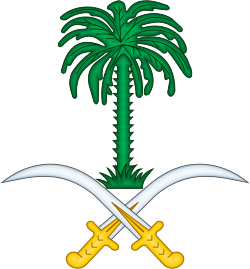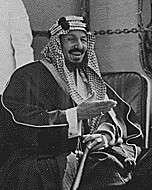Turki II bin Abdulaziz
Turki (II) bin Abdulaziz Al Saud (Arabic: تركي الثاني بن عبد العزيز بن عبد الرحمن آل سعود, Turkī ṯ-Ṯānī bin ʿAbd al-ʿAzīz ʿĀl Saʿūd) (1934 – 11 November 2016)[1] was a member of the House of Saud.
| Turki II bin Abdulaziz | |||||
|---|---|---|---|---|---|
| Saudi Prince | |||||
| Deputy Minister of Defense and Aviation | |||||
| In office | July 1969–1978 | ||||
| Successor | Abdul Rahman bin Abdulaziz | ||||
| Monarch | King Faisal King Khalid | ||||
| Born | 1934 | ||||
| Died | 11 November 2016 (aged 81–82) Riyadh | ||||
| Spouse | Noura bint Abdallah bin Abdul Rahman Hind Al Fassi | ||||
| Issue | Prince Khalid Prince Sultan Prince Faisal Prince Fahd | ||||
| |||||
| House | House of Saud | ||||
| Father | Ibn Saud | ||||
| Mother | Hussa bint Ahmed Al Sudairi | ||||
| Religion | Wahhabi Hanbali Sunni Islam | ||||
Early life and education
Prince Turki was born in 1934.[2][3] He was a member of the Sudairi Seven, a powerful faction of brothers within the Al Saud. His parents were Ibn Saud and Hassa Al Sudairi.[4] He was known as Turki "the second" (الثاني ath-thānī) because he was the second son born to Ibn Saud named "Turki". The first Prince Turki was Abdulaziz's first son who died in 1919 due to Spanish flu.[2]
Prince Turki studied at the Princes' School established by his father.[5]
Career
Turki bin Abdulaziz assumed the Riyadh principality delegation on 10 October 1957, because Prince Salman, (later to become King Salman) then-Riyadh governor, travelled with King Saud to Lebanon.[5] In 1960, the approval of the King was issued to assign Prince Turki as the governor of the Riyadh Province in the period of the formal vacation of Prince Salman. Turki bin Abdulaziz was appointed the deputy defense minister in July 1969 by a royal order.[6] His tenure lasted for nine years and he was forced to resign from office due to his marriage in 1978.[7][8]
Controversy
After his falling-out with other princes and joining with the free princes group, Turki bin Abdulaziz moved to Cairo and lived there in self-imposed exile for a time.[9][10] However, other research on the Free Princes Movement does not mention his name as part of this group;[11] so an alternate explanation of his self-exile in Cairo offers that it occurred as a result of an intra-family dispute due to his marriage to Hind Al Fassi (See also below and Personal life section).
In February 1982, Turki bin Abdulaziz and his family, while living in Miami, were accused of holding an Egyptian servant against her will. Officers from the Metro Dade Police Department (MDPD) searched his apartment with a warrant but failed to find the woman. However, the police encountered fierce resistance from Prince Turki's bodyguards. He eventually sued the MDPD for $210 million, wherein the defendant then launched a countersuit. The State Department granted him diplomatic immunity in April 1982 and the lawsuit was dropped in June 1982.[12]
In a letter published by Wagze news agency in July 2010, Prince Turki is reported to have warned Saudi Arabia's ruling family of a fate similar to that of Iraq's executed dictator Saddam Hussein and the ousted Iranian Shah Mohammad Reza Pahlavi, calling on them to escape before people "cut off our heads in streets." He argued that the Saudi royal family was no longer able to "impose" itself on people, arguing that deviations in carrying out the religious concepts that make up the basis of the Saudi government "have gotten out of our hands," so that the opposition views our acts as "interfering in people's private life and restricting their liberties." He further urged "Do it today before tomorrow as long as the money we have is enough for us to live anywhere in the world; from Switzerland to Canada and Australia…we should not return as long as we are able to get out safely, we must take our families quickly and pull out.", continuing "Do not fool yourself by relying on the United States or Britain or Israel, because they will not survive the loss; the only door open is now the exit door of no return. Let us go before it closes." He finally warned against a military coup against the ruling family, saying "no one will attack us from outside but our armed forces will attack us."[13] However, later Turki bin Abdulaziz told Saudi Press Agency that the alleged letter to him circulated by some media and internet sites was nonexistent and fabricated by enemy parties wishing to spread confusion and excitement.[14]
Another controversy he experienced was about the death of his wife Hind al Fassi in August 2010. Her brother Allal al Fassi accused his brother-in-law, Prince Turki as well as his nephew and niece of killing his sister with a drug overdose. He submitted a report to the Attorney General and then, disappeared for 24 hours and reappeared after the medical report proved that there was nothing wrong in her system, leading to the withdrawal of all his accusations to his brother in law.[15] On the other hand, Prince Turki's son, Abdul Rahman, sued his uncle Allal al Fassi claiming that he beat him and his father in the hospital where his mother died.[16]
So, as a total result, although in 2012 he was left as Hussa's eldest son, he was of course bypassed for the throne.
Views
During the Iraqi invasion of Kuwait in 1990, Prince Turki argued in a press conference that the United Nations' embargo was not enough to drive the Iraqi army out of Kuwait. For him, military action was required to achieve it.[17]
After returning to Saudi Arabia in 2011, Prince Turki fully supported the appointments of his younger brothers, late Prince Nayef and Prince Salman. He argued in October 2011 that the decision to appoint late Prince Nayef as Crown Prince was totally right and that Prince Nayef had wisdom, sound management and long history in serving the country.[18]
Personal life
Turki bin Abdulaziz's first wife whom he divorced to marry Hind Al Fassi was Noura bint Abdallah bin Abdul Rahman.[19][20]
His second wife was Hind Al Fassi, a member of the Saudi Arabian al-Fassi family and daughter of Sheikh Shams ed-din Al Fassi, a Sufi religious leader from the Shadhili order, and great-grandson of Moroccan Sufi Imam al-Fassi, a Hasani Idrissi descendant of Prophet Mohammed, who had settled in Mecca in the late 18th-century.[12][19] Turki bin Abdulaziz sacrificed his position as deputy defense minister and moved from the Kingdom into a self exile because he refused to divorce her in late 1970s. Therefore, he lost not only his position but also his candidacy for the Saudi Throne. Later, he and his wife went to Egypt in the late 1970s and never returned to Saudi Arabia together again. She died in 2010 in Cairo at the age of 57.[9][19] After her death, Prince Turki returned to Saudi Arabia.[21]
Prince Turki had four sons from his first marriage, Prince Khalid (born December 1957), Prince Sultan (born May 1968), Prince Faisal (born January 1965) and Prince Fahd (born August 1959).[2][20] In 1975, Prince Turki's elder sons took $1.1 million loan from the U.S. Export-Import Bank (Eximbank) to finance their business in relation to rice mills in Saudi Arabia.[22] Prince Khaled is the cofounder of Arab National Bank.[23]
One of Prince Turki's daughters is married to Khalid bin Sultan. His son, Sultan bin Turki II bin Abdulaziz Al Saud, was "kidnapped" in Geneva and placed under house arrest in Riyadh in 2004 after he spoke out in favour of reform in Saudi Arabia.[10] Another son, Faisal bin Turki, is an adviser at the ministry of petroleum and natural resources.[24][25]
Prince Turki died on 11 November 2016.[26] He was buried at Al Oud cemetery in Riyadh.[26]
Ancestry
| Ancestors of Turki II bin Abdulaziz | |||||||||||||||||||||||||||||||||||||||||||||||||||||||||||||||||||||||||||||||||||||||||||||||||||||||||||||||||||||||||||||||||||||||||||||||||||||||||||||||||||||||||||||||||||||||||||||||||||||||||||||||||||||||||||||||||||||||||||||||||||||||||||||||||||||||||||||||||||||||||||||||||||||||||||||||||||||||||||||||||||||||||||||||||||||||||||||||||||||||||||||||||||||||||||||||||||||||||||||||||||||||||||||||||||||||||||||||||||||||||||||||||||||||||||||||||||||||||||||||||||||||||||||||||||||||||||||||||||||||||||||||||||||||||||||
|---|---|---|---|---|---|---|---|---|---|---|---|---|---|---|---|---|---|---|---|---|---|---|---|---|---|---|---|---|---|---|---|---|---|---|---|---|---|---|---|---|---|---|---|---|---|---|---|---|---|---|---|---|---|---|---|---|---|---|---|---|---|---|---|---|---|---|---|---|---|---|---|---|---|---|---|---|---|---|---|---|---|---|---|---|---|---|---|---|---|---|---|---|---|---|---|---|---|---|---|---|---|---|---|---|---|---|---|---|---|---|---|---|---|---|---|---|---|---|---|---|---|---|---|---|---|---|---|---|---|---|---|---|---|---|---|---|---|---|---|---|---|---|---|---|---|---|---|---|---|---|---|---|---|---|---|---|---|---|---|---|---|---|---|---|---|---|---|---|---|---|---|---|---|---|---|---|---|---|---|---|---|---|---|---|---|---|---|---|---|---|---|---|---|---|---|---|---|---|---|---|---|---|---|---|---|---|---|---|---|---|---|---|---|---|---|---|---|---|---|---|---|---|---|---|---|---|---|---|---|---|---|---|---|---|---|---|---|---|---|---|---|---|---|---|---|---|---|---|---|---|---|---|---|---|---|---|---|---|---|---|---|---|---|---|---|---|---|---|---|---|---|---|---|---|---|---|---|---|---|---|---|---|---|---|---|---|---|---|---|---|---|---|---|---|---|---|---|---|---|---|---|---|---|---|---|---|---|---|---|---|---|---|---|---|---|---|---|---|---|---|---|---|---|---|---|---|---|---|---|---|---|---|---|---|---|---|---|---|---|---|---|---|---|---|---|---|---|---|---|---|---|---|---|---|---|---|---|---|---|---|---|---|---|---|---|---|---|---|---|---|---|---|---|---|---|---|---|---|---|---|---|---|---|---|---|---|---|---|---|---|---|---|---|---|---|---|---|---|---|---|---|---|---|---|---|---|---|---|---|---|---|---|---|---|---|---|---|---|---|---|---|---|---|---|---|---|---|---|---|---|---|---|---|---|---|---|---|---|---|---|---|---|---|---|---|---|---|---|---|---|---|---|---|---|---|---|---|---|---|---|---|---|---|---|---|---|---|---|---|---|---|---|---|---|---|---|---|---|---|---|---|---|---|---|---|---|---|---|---|---|---|---|---|---|---|---|---|---|---|---|---|---|---|---|---|---|---|---|---|---|---|---|---|---|---|---|---|---|---|---|---|---|---|---|---|---|---|---|---|---|---|---|---|---|---|---|---|---|---|---|---|
| |||||||||||||||||||||||||||||||||||||||||||||||||||||||||||||||||||||||||||||||||||||||||||||||||||||||||||||||||||||||||||||||||||||||||||||||||||||||||||||||||||||||||||||||||||||||||||||||||||||||||||||||||||||||||||||||||||||||||||||||||||||||||||||||||||||||||||||||||||||||||||||||||||||||||||||||||||||||||||||||||||||||||||||||||||||||||||||||||||||||||||||||||||||||||||||||||||||||||||||||||||||||||||||||||||||||||||||||||||||||||||||||||||||||||||||||||||||||||||||||||||||||||||||||||||||||||||||||||||||||||||||||||||||||||||||
References
- "Royal Court: Prince Turki bin Abdulaziz Al Saud Died". Saudi Press Agency. Retrieved 12 November 2016.
- Henderson, Simon (1994). "After King Fahd" (Policy Paper). Washington Institute. p. 74. Retrieved 2 February 2013.
- "Saudi King's brother Prince Turki bin Abdulaziz passes away". Al Alarabiya English. 12 November 2016. Retrieved 13 November 2016.
- Winberg Chai (22 September 2005). Saudi Arabia: A Modern Reader. University Press. p. 193. ISBN 978-0-88093-859-4. Retrieved 26 February 2013.
- "His royal highness prince Turki bin Abdulaziz Al Saud". Ministry of Interior. Retrieved 22 May 2012.
- Kechichian, Joseph A. (2001). Succession in Saudi Arabia. New York: Palgrave.
- "Princes are glue of nation". The News and Courier. AP. 22 April 1990. Retrieved 3 March 2013.
- James Wynbrandt (2010). "A" Brief History of Saudi Arabia. Infobase Publishing. p. 238. ISBN 978-0-8160-7876-9. Retrieved 3 April 2013.
- Henderson, Simon (August 2009). "After King Abdullah: Succession in Saudi Arabia" (PDF). Policy Focus #96. Washington Institute for Near East Policy. Retrieved 12 May 2011.
- Hardy, Roger (21 January 2004). "Saudis 'kidnap reformist prince'". BBC News. Retrieved 12 May 2011.
- Soubra Barrage, Rada (2007). "The domestic challenges facing Saudi Arabia" (PDF). ecommons. Archived from the original (PDF) on 5 October 2013. Retrieved 8 May 2012.
- Hackley, Randall (9 September 1982). "Saudi prince's life in the U.S. leads to suits and countersuits". Associated Press. Leader-Post. p. A8. Retrieved 12 May 2011.
- "Prince warns S. Arabia of apocalypse". Press TV. 9 June 2010. Archived from the original on 16 May 2012. Retrieved 25 March 2012.
- "Denial of Prince Turki bin Abdul Aziz". Saudi Press Agency. Archived from the original on 17 May 2014. Retrieved 30 March 2012.
- "Arabic X-Files:RIP Hend El-Fassi". Egyptian Chronicles. Retrieved 25 May 2012.
- "Dispute over Saudi princess mysterious death". The Siasat Daily. 26 August 2010. Retrieved 25 May 2012.
- "Saudi Prince calls for swift action against Iraq's Saddam". The Prescott Courier. Cambridge, Mass. AP. 19 August 1990. Retrieved 19 August 2012.
- "Saudis swear allegiance to Crown Prince". Zawya. 30 October 2011. Archived from the original on 17 May 2014.
- "Death on the Nile: A royal murder mystery?". Datarabia. 15 September 2010. Retrieved 26 May 2012.
- Sabri Sharaf (2001). The House of Saud in Commerce: A Study of Royal Entrepreneurship in Saudi Arabia. Sharaf Sabri. p. 124. ISBN 978-81-901254-0-6. Retrieved 2 April 2013.
- Bremmer, Ian (2 March 2012). "The next generation of Saudi royals is being groomed". Foreign Policy. Archived from the original on 21 May 2012. Retrieved 26 March 2012.
- Treen, Joseph (16 August 1975). "Saudi Princes get US loan". The Victoria Advocate. Washington Post News Service. Retrieved 7 August 2012.
- "Appendix 7. Leading Grandsons of Abdul Aziz" (PDF). Springer. Retrieved 13 August 2020.
- "The Al Saud dynasty". Islam Daily. 6 July 2006. Archived from the original on 2 November 2013. Retrieved 18 April 2012.
- "Saudi Arabian Government Ministries". The Saudi Network. Retrieved 4 May 2012.
- Rashid Hassan (13 November 2016). "Saudi Arabia mourns Prince Turki bin Abdulaziz". Arab News. Retrieved 14 November 2016.

